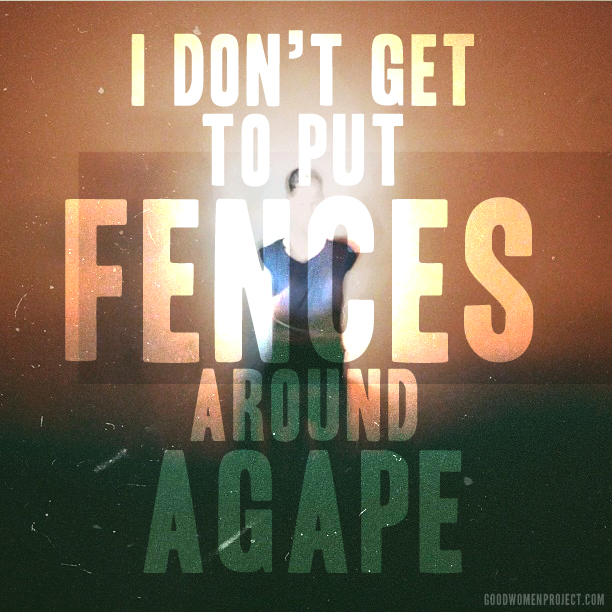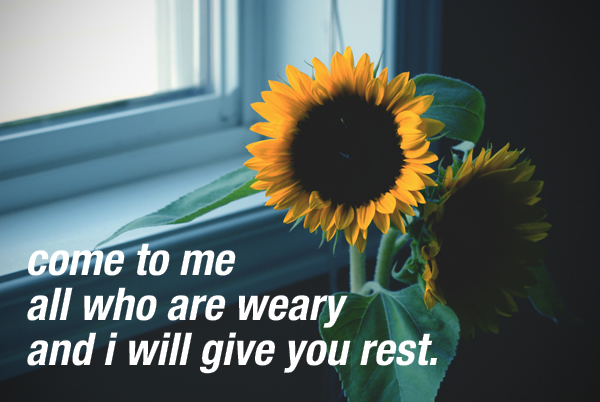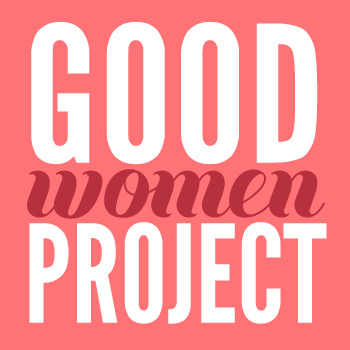When Your Brother Is Gay

Editor’s Note: I have a favor to ask. As you read this, read it out loud. Resist the urge to skim, and slow your mind and your heart to the speed of the words as they were written to be heard. Today’s post is Anonymous, but if you would like to be put in touch with her, you may email me at lauren[at]goodwomenproject.com. – Lauren
When my brother told me he was gay, I started to cry. I could not locate the origin of those tears in the moment. They just spilled over my eyelids before I could catch them. In retrospect, I understand. Those tears were the realization that my family was no longer the way it used to be. They were the realization that the old had past, and that we were being ushered into a new epoch.

Photo by Branden Harvey
Ironically, the first words to come out of my mouth were, “It doesn’t change anything.” Of course it changed something, and yet, it changed nothing. My brother is no different than the man he was two months ago. He is still the kindest, most loving, generous man I know. There are no more secrets. Granted, I knew him well before. But now, I truly know him.
I know every part of his identity, and am therefore able to love him more fully.
I have a confession to make: I do not know what God thinks about same-sex attraction. I have studied, read, and prayed, and still each side’s case seems solid. Maybe one day God will impart some answers to my questions. Are individuals born gay? Is marriage reserved for a man and a woman? Is sexual orientation socially constructed? What does it mean to be attracted to men or women?
I have a second confession to make: I don’t really care anymore.
After one long afternoon of reading numerous books on sexual orientation and Christianity, I turned on the news and saw the story of a young lesbian in Texas who was shot to death.
And suddenly all of those questions became very small, and a whole new set of questions began to freely dance in my mind and become very big: why is my brother the target of hate groups? Why do complete strangers want him dead? Why doesn’t he feel the freedom to share his sexual orientation with his small group? Why is he scared of telling my parents?
These are the questions that matter. These are the questions I want answers to.
God took the training wheels off my heart and said, “Go”. Go fight for them, go to the pride parades, go to the LGBT support groups on campus, go hear their stories. Leave the judgment up to Me. I realized that if I truly love my brother as much as I claim, that love must extend itself to the gay community. I don’t get to put fences around agape. I don’t get to live in the suburbs of God’s love for humanity. And so I took the midnight train, and I went. I urge you to go as well, do not be afraid.
These are our brothers and sisters, and just like us, they get to come to God just as they are.
The Earth swells with living water, and bottomless wells spring up. Come you who are thirsty, come. Do not suppress love.
Final Note: Comments discussing whether or not homosexuality is ‘right or wrong’ or ‘sinful’ will be heavily moderated for the safety of girls in our community. Comments are encouraged and welcomed, but NOT to discuss right vs wrong and TO discuss love, true friendship, and grace. Thank you for understanding.
Setting Boundaries With Parents: Psychological & Emotional Abuse

 Editor’s Note: Emotional and psychological abuse are real. Their damage is valid. Their pain is pain. If you have or are experiencing (or aren’t sure) emotional or psychological abuse, I beg of you to do a little research and confide in someone safe. Because of it’s nature in damaging a healthy self that would leave in pursuit of protection, we often remain in the harmful situation, handicapped. Or, when life moves along, we remain in a state of denying it’s occurrence. Leaving a psychologically abusive home was the hardest decision I’ve ever made in my life, but it bulldozed down the forest and made way for my heart and my future. Today, Candice Noble bravely shares some of her story. – Lauren
Editor’s Note: Emotional and psychological abuse are real. Their damage is valid. Their pain is pain. If you have or are experiencing (or aren’t sure) emotional or psychological abuse, I beg of you to do a little research and confide in someone safe. Because of it’s nature in damaging a healthy self that would leave in pursuit of protection, we often remain in the harmful situation, handicapped. Or, when life moves along, we remain in a state of denying it’s occurrence. Leaving a psychologically abusive home was the hardest decision I’ve ever made in my life, but it bulldozed down the forest and made way for my heart and my future. Today, Candice Noble bravely shares some of her story. – Lauren
I grew up with an abusive and manipulative father. It wasn’t exactly hidden from me as a child; I heard the arguments and had some sense (in a child like way) that dad was hurting mom. I even witnessed a disturbing scene where my mother had to literally fight for her life when my dad went into an uncontrollable and irrational rage against her. My mom left my father when I was six years old.
My dad’s selfish and abusive personality wasn’t limited to my mother, but I didn’t realize I was a victim until I turned twenty. One night, he verbally attacked me over the phone and accused me of all the damage in our relationship. He was responsible for it, but in one call, he shifted all the blame to me. Fourteen years of his neglect, his instability, his hurtful selfishness, his manipulation somehow became my fault.
After that event I began reviewing, in objective honesty, all the things he had said and done to me over my life. Because of that blatant attack, I could finally see the other assaults that I chose to brush off and ignore before. That single undisguised act of aggression tore the veil from my eyes and I could see his past and present behavior for what it truly was: his emotional and psychological abuse. His manipulation.
Psychological and emotional abuse is a tricky little beast. It can easily be dismissed or covered up so well that the victim has a difficult time identifying it as abuse. Generally speaking, if it feels like abuse and fits a certain set of standards then it is abuse, and it needs to be addressed. I put up with years of “this doesn’t feel right” before I finally could identify it as abuse.

Photo by Alyssa Valleta / / Design by Lauren Dubinsky
Once I began to identify abusive behaviors, I had to let go of the “healthy” father/daughter charade that tore me up from the inside out. I had to set a boundary line of protection in order to pursue safety. In my case, that meant stopping all communication with him.
I hate to admit it, but I feel a sense of relief after letting go of the relationship I clung to for so long with my father. It feels as if I’ve been on the brink of suffocation for years and now I’m finally allowed to breathe.
When we become a Christian (or are raised Christian), we can lose sight of the need for boundaries. To some of us, being “a good Christian” has meant that we have to endure someone’s abuse for any number of misguided pious reasons: It’s an act of forgiveness, it shows love, they’re an authority figure, or it’s to further a witnessing ministry. These are all ignorant assumptions created by playing fast and loose with the interpretation of scripture (be it ourselves or others doing the interpreting).
Yes, we are suppose to forgive others if we wish to be forgiven by the Father. But forgiveness means letting go of any hatred or bitterness in your heart towards the offending person and not seeking revenge on them. It does not mean you have to allow a habitual abuser into a space that leaves you vulnerable to their attacks.
Yes, you are to still love the person but that doesn’t give them the right to exploit that love to manipulate you and you don’t have to stand for that manipulation.
Yes, in the structure of the family, they may be classified as the “authority” figure but that authority becomes illegitimate once the abuser uses that authority in an inappropriate manner. God does not turn his eyes from hurting children, caring only that they submit to authority – whatever that authority be.
Yes, you are to be a living and speaking witness but you are not asked to suffer for anything other than the Gospel. Are they abusing you strictly because you’re a bold follower of Christ, or because they’re abusive and need someone to horde an illusion of power over? In other words you are to endure persecution for the Gospel but you shouldn’t feel obligated to endure personal attacks that are unrelated to your belief in Christ.
Furthermore, Christ Himself said that once you have spoken your piece concerning Him to others and they reject it, you are allowed to take that gospel elsewhere to those who will receive it (Luke 9:4-6). Once you’ve exhausted all your ministering resources on an abusive person then do not, I repeat, do not feel an ounce of guilt about taking yourself and your ministry elsewhere to those who will hear it (one of Christ’s favored phrases “He who has ears to hear, let him hear!” Matthew 11:15).
It is not your job to change this person. Only God Himself can do so. Remaining with an abusive person for the sake of changing them through your positive influence is a misguided perspective, nearly certain to fail – and it places you in suffering that is not required or expected of you.
In the end, the excuses used to continue a hurtful relationship fall short of one very clear truth: If Christ, God in flesh sinless and holy, saw you of enough worth to willingly suffer and die for then that means you retain an incalculable value. Things that are of high value deserve protection. Please, do not tolerate a person who doesn’t see that value and treats you in a way that suggests you are common trash, because you are not common trash. You are inherently valuable because you bear the image of God.
Your situation may not require that you cut off communication from the person harming you, but if you’re being systemically hurt (mentally or physically) you still need an established line of defense and safety. This can be as simple as speaking up against a hurtful word or action.
Maybe they will listen, repent, reform their ways, and this will lead to a healthy and beneficial relationship. If they won’t stop, or it is consistently harmful, it is time to let go of that relationship and that person. It will hurt or feel foreign to you at first. You may be criticized for the action you take. But, it’s better than the slow and painful death of your spirit (or your body if it has crossed the line to physical abuse).
If you can’t “let go” of the relationship because it involves a family member and you’re still dependent on them, please seek the safety of someone you trust. Find another family member or a trusted friend if for nothing else but a temporary shelter.
You have a right and a responsibility to protect yourself physically and mentally and communicate your value by telling others you will not tolerate their abuse. Trust me I know it’s scary and there are a number of reasons why you don’t want to oppose them and cause conflicts. I’ve been there and done that. Though it is frightening, it is crucial to your future. You have no need to feel guilt, shame, or fear as a result of upholding your value and maintaining your health to someone who doesn’t see the importance of either.
If you have experienced emotional or psychological abuse and have resources that you recommend to other readers, please feel free to leave them in the comments. We realize that this is frequently under-addressed in our community, and we are striving provide more love, support and encouragement for you as you pursue safety for your heart. Thank you, beautiful women.
Setting Boundaries In A Single Parent Home

 Editor’s Note: Wanting to love our parents can easily take the form of wanting to care for their emotional needs, and learning to trust God with them can be so difficult. Today’s post is submitted by Anonymous, but if you’d like to be in contact with her, please send an email to trish[at]goodwomenproject.com & Trish will connect you. – Lauren
Editor’s Note: Wanting to love our parents can easily take the form of wanting to care for their emotional needs, and learning to trust God with them can be so difficult. Today’s post is submitted by Anonymous, but if you’d like to be in contact with her, please send an email to trish[at]goodwomenproject.com & Trish will connect you. – Lauren
When you come from a single parent family, its very easy for boundary lines to blur. The older brother tries to be the dad, the big sister mothers the little sister, and the Mum treats the big sister as her friend and not her daughter. All the kids rely heavily on the one parent, because she is all they’ve got in the world. Everyone buckles under the pressure.
I grew up in a version of the above family, and I know many other people who did too. Kids from single parent families are often very close with the parent that raised them. It’s only natural and it makes sense, but often, it’s not right and it’s not healthy. So many children thrive from the love and care of one amazing parent; I know I have. But the difficult part is the crippling co-dependency that can result from single parenting, because both parent and child struggle to let go when it’s time.

Photo by Laura Pett / / Design by Lauren Dubinsky
It breaks my heart that my Mum doesn’t have a husband to talk to and lean on. She’s a confident and capable woman that is moving forward with her life, but she still needs TLC like everyone else. However, I have had to learn that her happiness is not my responsibility and I have to live my life. I cannot fill the gap of a husband or friend in her life. Because I’m mature and grew up fast, she talked to me and confided in me as a friend from a young age. Eventually, I resented it – because I would carry all her pain on my shoulders. As I got older, our relationship grew sour. The boundaries were blurred – and as a result, we couldn’t flourish as mother and daughter.
So I put the boundary line back in place by moving away. I needed to become my own person without my family’s issues weighing me down.
It was the hardest thing to do, but also the best thing I’ve ever done for my own emotional health. In saying that, it’s taken time, and the progress didn’t happen immediately. I soon realized that even after leaving the country, I was still heavily burdened by my broken and hurting family. You can leave the situation, but your problems often go with you. I cared so much it hurt – and that is where it went wrong.
I couldn’t move on with my exciting new life if I continued to spend every waking second worrying about my family’s choices. It would break me every time bad news crossed seas and landed at my doorstep. I wanted to save them so badly that I wouldn’t and couldn’t trust God with them. I didn’t pray because I thought that somehow, in another world or life, I could save them. I held them tightly in my fist, stubborn and angry, sure that I could change them or their situation if I held on tight enough. And from half a world away, it affected every area of my life. It had to stop.
I had to learn and re-learn multiple times that yes, they are my family and I love them, but I cannot change them and I cannot save them. We all love our families; we all hate to see them go through hard times and that’s entirely natural. But for each of us to have healthy futures and relationships, there has to be boundaries within our families. This is especially important in highly dysfunctional and/or single parent families.
Four years on, there are still times when it all gets too much and I want to snatch back that empty control. That’s when I turn to this scripture:
Come to me, all you who are weary and burdened, and I will give you rest. Matthew 11:28
These days if my Mum ever calls me in tears, I answer knowing ahead of time that I can’t change anything and she just needs a listening ear. If it gets too much to handle, I end the conversation. If I know that I’m not in the right space to cope with the call, I don’t answer the phone. Yes, it may seem harsh, but it is necessary.
I can listen to them, pray for them and cheer them on. I will help my Mum when she’s elderly, I will support my siblings through every season in their lives and I will never turn my back on them. But my heart can no longer take their burden, that’s God’s job alone. I’ve let go.
This weekend, I’ll be fasting for my family. They need persistent and faith filled prayer, but I won’t be worrying about their current situation because God’s got it. He’s their saviour, not me. Their burden is not mine to carry, their happiness is not my responsibility, and that’s where the boundary is.












